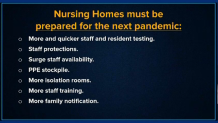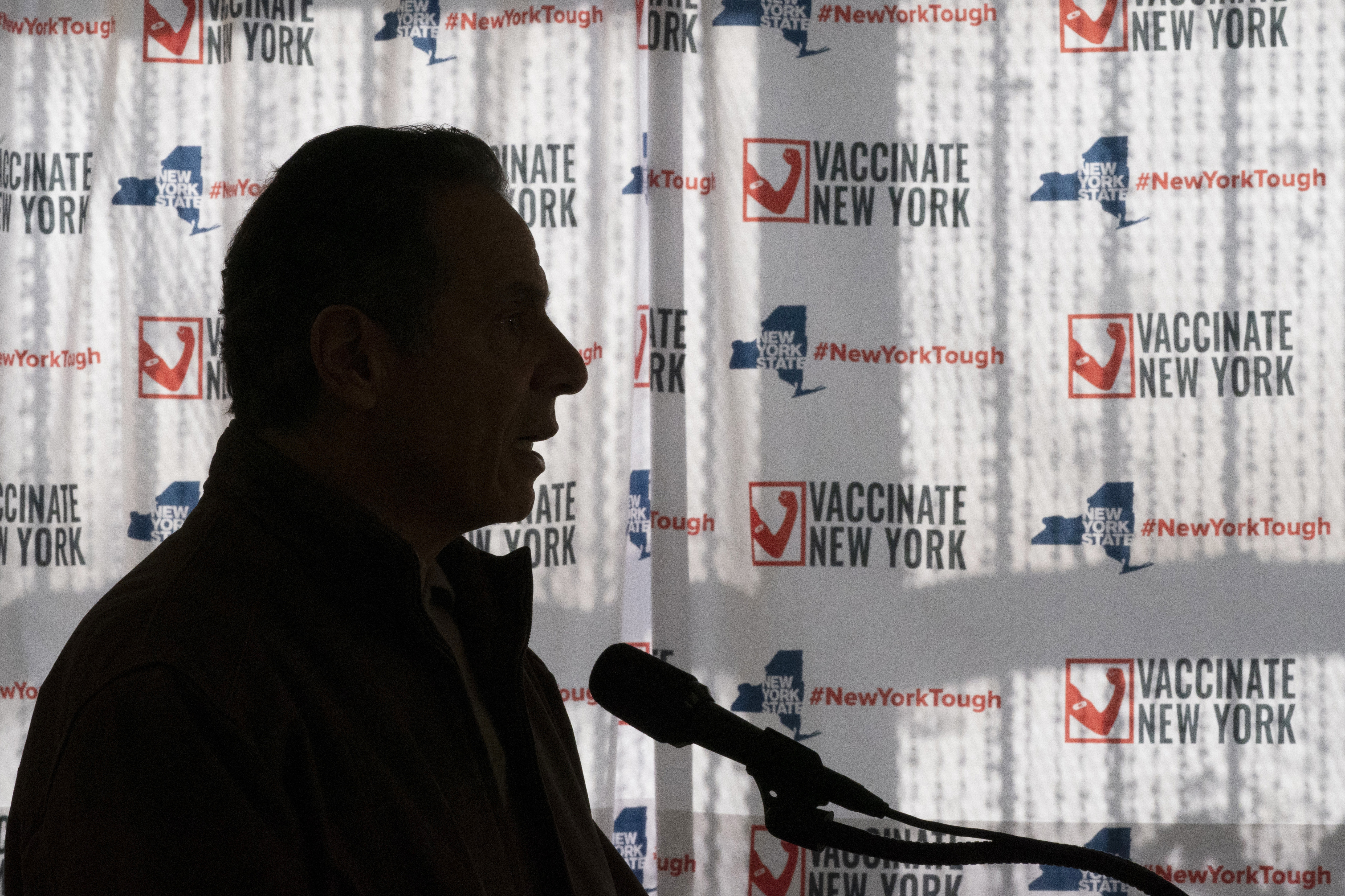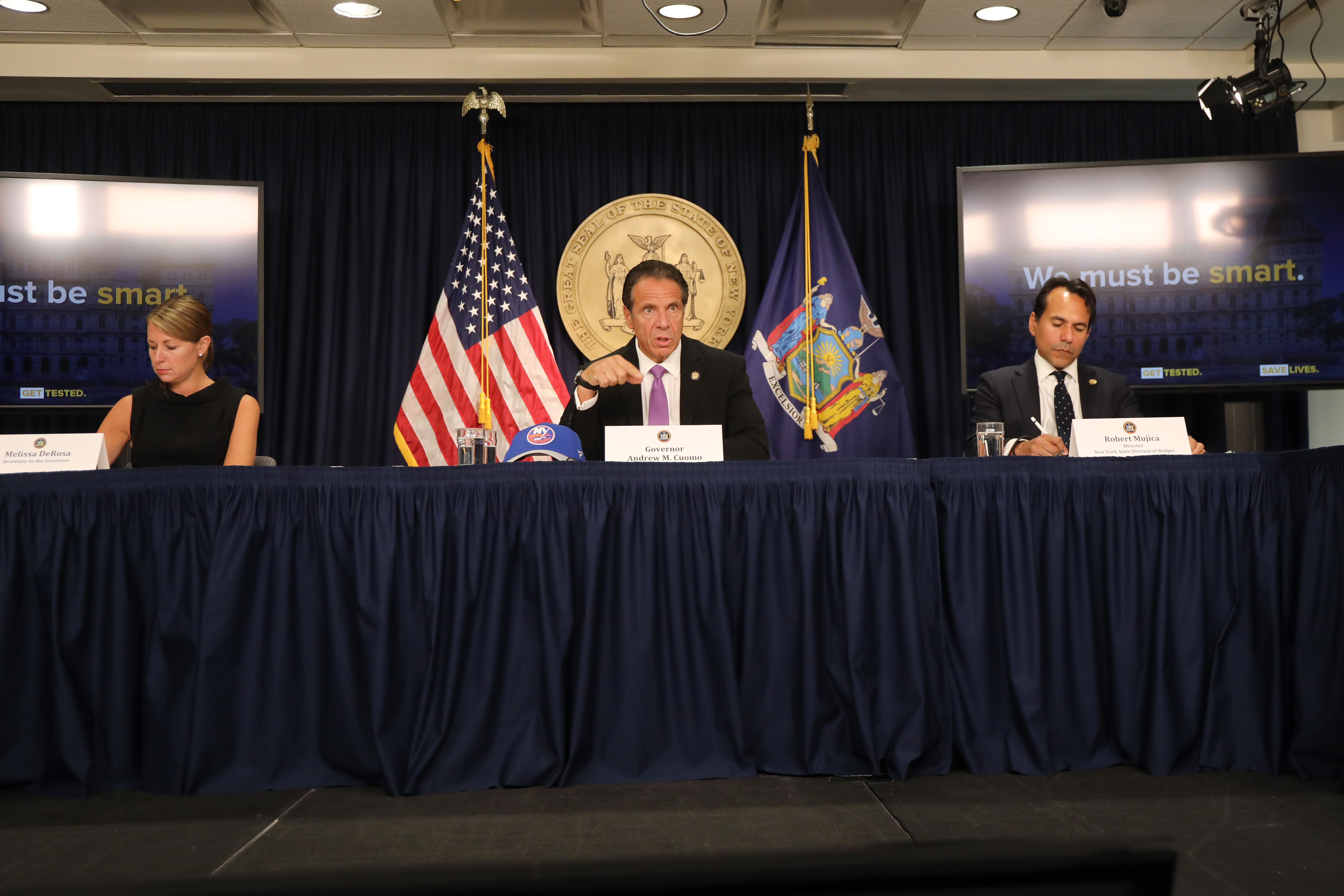What to Know
- The Brooklyn U.S. attorney's office and the FBI have opened a preliminary investigation into the Cuomo administration's handling of nursing home-related data, senior officials say
- Current and ex-law enforcement officials say possible investigative avenues could include looks at potential false statements, any scheme to defraud the feds of funds or misuse of funds
- The Cuomo administration has acknowledged there was a "void" in information but said it did nothing "illegal" or "unethical" -- and tripled down on those comments Friday
Gov. Andrew Cuomo held a third briefing this week to defend his administration's accounting of COVID-related deaths in New York nursing homes, a matter that has prompted a new federal investigation and mounting bipartisan criticism.
Following an on-camera briefing Monday and a conference call Wednesday to clarify the timeline of nursing home actions taken since last March -- along with a series of lengthy press statements from the administration in between -- Cuomo returned in a live, on-camera press briefing Friday to "set the record straight."
Get Tri-state area news delivered to your inbox.> Sign up for NBC New York's News Headlines newsletter.
Cuomo said Friday he was not "aggressive enough in knocking down the falsities" sooner. "No one has a right to spread lies or misinformation that causes pain to families. I understand politics is a nasty business in this environment. I understand people lie, I get it, but this is different."
The core issue is two-fold. First, there was a now widely criticized late March health department order that required nursing homes to accept COVID-positive patients discharged from hospitals if they were able to do so. Cuomo's administration says it was following the guidance of the CDC and Centers for Medicare & Medicaid Services under then-President Donald Trump.
Health Commissioner Dr. Howard Zucker defended the March 25 directive, which also banned nursing homes from testing patients before entry. That policy was later reversed in May. At the time, Zucker said, New York's coronavirus hospitalization rate was growing "at a staggering pace" and capacity in the state's intensive-care units was running thin. By allowing the residents to return to the nursing homes, it helped protect the health-care system from collapsing, he said.
Then, late last month, a state attorney general report alleged the governor's administration underreported nursing home COVID deaths by up to 50 percent. Cuomo's team said that was a matter of reporting deaths of nursing home patients at hospitals versus at their facilities. It has since released updated numbers on nursing home deaths -- nearly 13,500 deaths within or outside nursing homes, up from the previously disclosed 8,500 in-nursing home deaths.
The total numbers never changed, the governor's office said. It was a matter of location and the "void" that the reporting lag created.
Cuomo said during his press conference Friday that legislators "agreed" that his administration could delay the response to the state legislature's request for nursing home data while they dealt with a Department of Justice request first. However, a spokesperson for New York Assembly Speaker Carl Heastie said they didn't agree to any delays, but rather that they "never stopped asking for the information" and "were under the belief that we would get it, but unfortunately that never happened."
That lag and questions about the accounting prompted bipartisan criticism, including from Democratic state Assemblyman Ron Kim, who claimed Cuomo threatened him over his criticism of the administration's response. New York City Mayor Bill de Blasio said he wasn't surprised by the bullying allegations, calling them, "Classic Andrew Cuomo."
The governor has denied any allegations of wrongdoing at every turn and came prepared Friday to look to the future, ending his presentation with a list of nursing home reforms he wants to be implemented before the "next pandemic" hits. Among his top concerns, facilities must have the necessary supplies and staff on hand to meet the demands of a crisis response, he said.

There should also be "more regulation on the use of funding," Cuomo said, who cautioned against letting nursing homes become "money making machines."
"We should regulate -- of the funding we give to nursing homes -- how much goes to funding for staff, salary caps for management, and having a limited profit margin," the governor said. "I am going to propose a reform agenda today. I will not sign the budget without this nursing home reform plan. Period."
While Cuomo looks to the future, many are still looking into his past. Joining the calls of many state elected officials for an investigation into the Cuomo administration's handling of nursing homes, Democratic Rep. Alexandria Ocasio-Cortez offered her support of an investigation, releasing a statement in the middle of Cuomo's Friday briefing.
"Thousands of vulnerable New Yorkers lost their lives in nursing homes throughout the pandemic. Their loved ones and the public deserve answers and transparency from their elected leadership, and the Secretary of the Governor's remarks warrant a full investigation," she said in a statement.
Assemblyman Kim became a centerpiece of the governor's public battle to control the conversation around the state's nursing home response after the Queens Democrat claimed he was yelled at and threatened by Cuomo after criticizing the governor.
The Brooklyn U.S. Attorney's Office and the FBI have opened a preliminary investigation into the Cuomo administration's handling of nursing home-related data, according to senior officials familiar with the probe.
The U.S. Eastern District is likely handing this investigation in part because U.S. Attorney Audrey Strauss for the Southern District is the mother-in-law of Cuomo’s aide Melissa DeRosa and would have to recuse herself and her office. Federal spokespeople have declined comment since the report of the investigation.
Now Kim says Cuomo is "trying to punish me" for speaking out.
In a Zoom interview with NBC New York on Wednesday, Kim broke down and had to end the conversation after recounting how the furious governor called him at home, when he was with his wife and kids.
"He spent 10 minutes berating me, yelling at me, threatening me and my career, my livelihood," Kim said. The lawmaker said that his wife heard much of the interaction and was shocked and scared, saying she "didn't sleep that night."
Kim says the governor's team could have disclosed the numbers months ago, and with that data, believes policy changes could have possibly helped save lives.
"I refuse to be a cover-up for him, and that's why he's coming after me and trying to punish me," Kim said, adding he's just trying to do what he believes is the right thing. "They admitted to covering up information about life and death."
He is one of many now in Albany, from both sides of the political aisle, accusing the administration of a cover-up, saying it was done to "protect (Cuomo's) politics, his political future."
A senior aide to the governor said that he was in the room when the call was made and alleged that "Mr. Kim is lying about the conversation" and that "at no time did anyone threaten to 'destroy' anyone with their 'wrath' nor engage in a 'coverup.' That's beyond the pale."
During a call with reporters, Cuomo similarly went after Kim.
"I said to him on the phone, 'There is still integrity and honor and decency in politics,'" the governor said.
Cuomo addressed the conversation the two had, saying there is past bad blood between the two politicians from Queens. Cuomo said it stems from a past unrelated issue in which he accused Kim of switching sides on nail salon safety in order to raise campaign money from the salons.
"I believe it was unethical, if not illegal, and I believe it's a continuing racket," the governor said.
Senior Cuomo Aide Rick Azzopardi said the assemblyman's comments are "part of a years-long pattern of lies...against this administration."
Kim brushed aside that take, saying it shows "a lack of leadership" to bring up the nail salon debate "when 15,000 have lost their loved ones in nursing homes."
In a statement later released by Kim, he alleged that Cuomo "surreptitiously slipped legal immunity into our state budget for hospital executives and for-profit nursing homes at the request of powerful lobbyists" who had previously donated to his campaign. He also slammed the administration's frequent response that they were getting the information to the feds as quickly as possible.
"As legislators we have a duty to uncover the truth behind the nursing home deaths and the governor's explanations do not add up," Kim' statement read. "While he claims he was taking time to answer the Justice Department, we saw him gallivant around on a book tour and victory lap across prime time cable shows."
On Wednesday, Cuomo again tried to placate families who lost loved ones, saying his failure to provide nursing home data sooner was a mistake — noting that it was "not illegal, not unethical. But just failed people in that moment."
Families are still not buying that explanation from the governor.
"Governor Cuomo turned nursing homes into COVID death chambers," said Tracey Alvino, who lost her 76-year-old father Daniel after he was in a Long Island nursing home for just 11 days to recover from an orthopedic operation when COVID hit. She said Cuomo needs to answer families' concerns.
"His feet need to be held to the fire, we need an independent at the state and federal level," said Alvino.
Some Republicans on the national level, including Iowa Sen. Chuck Grassley, have also called for an investigation into the governor's handling of nursing homes.
"As we publicly said, DOJ has been looking into this for months. We have been cooperating with them and we will continue to," said Rick Azzopardi, senior adviser to Cuomo.
Democratic and Republican lawmakers in New York are now reported to be reconsidering their decision to grant Cuomo emergency powers to contend with the COVID-19 crisis.
New York was hit hard in the early days of the pandemic, and until recently the state led the country in COVID-19 deaths. It had recorded 47,301 as of Wednesday, second only to California's 47,670 deaths, according to the most recent NBC News data.
Most of New York's deaths came in the early days of the pandemic, when public health officials were trying to figure out how the coronavirus was spreading.



